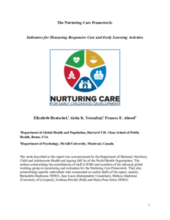Reliable and valid indicators to assess responsive caregiving and early learning activities are few. To fill this gap, two new indicators have been developed in support of programme implementation. These indicators need to be validated before they can be recommended widely. Read the report to learn more about the proposed indicators.
The Nurturing Care Framework (NCF) offers national governments a road map for strategic action to strengthen public policies, programmes and services, to ensure children’s good health and nutrition, protect them from threats, support responsive care, and promote opportunities for early learning. These strategic actions are intended to lead to healthy development of young children under three years through the creation of enabling environments for them and for their caregivers (WHO, UNICEF & WB, 2018). The implementation of the NCF requires five key actions: (1) Leadership and investment in early childhood; (2) Focus on addressing the needs of families with young children and their communities; (3) Strengthening child and family services; (4) Monitoring progress; and (5) Using data to improve the access, equity and quality of programmes and services. A Monitoring and Evaluation Framework is needed to support the uptake and implementation of the NCF in diverse global settings in order to hold decision makers accountable for investments, use data to improve access to and quality of services, and track progress for children’s health, nutrition, protection, and development, as well as their care. It is important that a monitoring and evaluation framework captures indicators related to implementation as well as impacts: inputs (activities and resources), outputs (programme expected results) and short- and longer-term outcomes for children (Aboud & Prado, 2018). A number of indicators already exist to capture the five domains of the NCF from input to outcome and are widely used at national and subnational levels to track progress in children’s health and nutrition services. However, less attention has been given to the domains of responsive care and early learning. In this report, our goals are to:
1. Describe the importance of responsive care and early learning for children’s healthy development.
2. Present evidence-informed measures for assessing responsive care and early learning, along with the training assessors need to use these measures. The measures are intended for use in monitoring and evaluating programmes promoting these practices as well as in surveys.
3. Propose recommendations for those who train, supervise and monitor frontline workers on ways to improve where necessary their messaging around responsive care and early learning.

